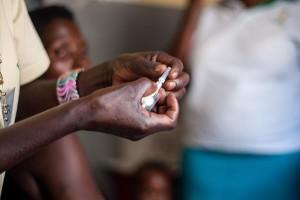
Originally published via PATH: Sayana Press Update - July 2016
“The body of research on contraceptive injectables and Sayana Press is growing—and the evidence is clear that this method is safe and effective.”
— Beth Fredrick, Advance Family Planning Executive Director
Advance Family Planning (AFP) grew out of the recognition that women’s ability to obtain their preferred contraceptive method often rests in the decisions of policymakers. Established in 2009, AFP is an advocacy initiative at the Bill & Melinda Gates Institute for Population and Reproductive Health, Johns Hopkins Bloomberg School of Public Health. AFP works with local leaders and partners in Africa, Asia, and Latin America to accelerate contraceptive choice and provide greater access to information, services, and supplies.
Sayana Press is one of those supplies. As AFP Executive Director Beth Fredrick says, “We see Sayana Press as an innovation that, if the right policies are in place, will overcome many of the barriers women face in trying to prevent pregnancy.”
The organization is closely following Sayana Press research being conducted by PATH, FHI 360, Tulane University, The Evidence Project, and others to determine which policies are needed to ensure that the product is affordable and available through both the public and private sectors.
AFP is active in many of the same countries in which Sayana Press has been introduced. Later this year, AFP plans to enlist researchers and advocates to identify strategies to increase contraceptive access with Sayana Press. Beth says, “Sometimes that will entail implementing existing policies that enable community health workers to provide contraceptive injectables. In other instances new policies will be needed. In some cases, for example, access will be a matter of whether pharmacists are able to sell Sayana Press, the product is available, and the price is right.”
Beth highlights other policy shifts that could increase family planning access, including adding Sayana Press to the essential medicines list in every country. She continues, “The body of research on contraceptive injectables and Sayana Press is growing—and the evidence is clear that this method is safe and effective.”
In addition, she says, “Updating the World Health Organization’s guidance on family planning and task-shifting to include Sayana Press and other methods that can be used with appropriate counseling and without a medical provider (such as emergency contraception) would also be highly influential in introducing and scaling up access in other countries.”
In Beth’s experience, most country leaders and partners are optimistic about Sayana Press. For example, AFP’s partner Reproductive Health Uganda, which worked with PATH on the self-injection feasibility study, sees the potential for overcoming inequity between rural and urban women. Other leaders and partners hope that Sayana Press will have lower discontinuation rates compared to other injectable contraceptives.
“From AFP’s perspective, we see Sayana Press for what it is…one piece of the puzzle of meeting a woman’s contraceptive needs throughout her life.”
Beth adds that Sayana Press is a potential means for young people to access contraception outside of facilities, including at pharmacies and drug shops, and that Sayana Press provides opportunities to address inequality in family planning access overall: “It opens a window for addressing the community stigma, spousal disapproval, and gender-based violence that many women experience in using contraception…. That’s something we can definitely get behind.”

